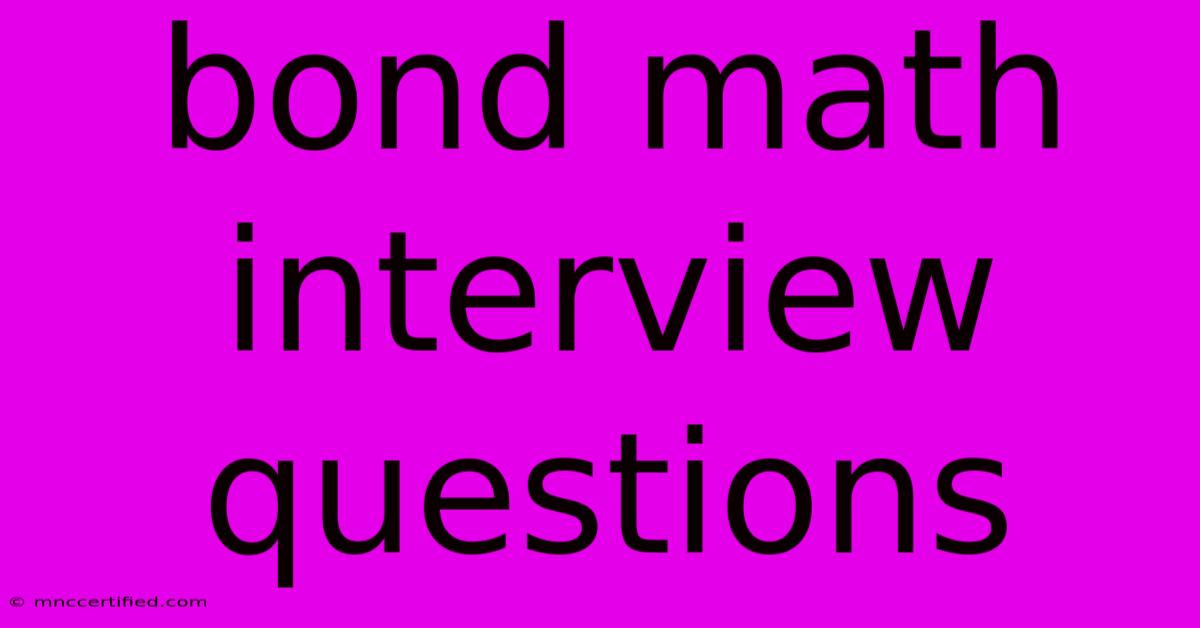Bond Math Interview Questions

Table of Contents
Ace Your Bond Math Interview: Essential Questions and Answers
Landing a job in finance often hinges on your ability to navigate complex financial concepts, and understanding bond math is crucial. This article equips you with the essential bond math interview questions and answers to confidently tackle your next interview. We'll cover everything from basic calculations to more advanced scenarios, helping you showcase your analytical skills and financial acumen.
Understanding the Fundamentals: Basic Bond Math Interview Questions
Before tackling advanced concepts, mastering the fundamentals is key. Expect questions testing your understanding of core bond characteristics and simple calculations.
1. What is a Bond? Explain its key features.
A bond is a fixed-income instrument representing a loan made by an investor to a borrower (typically corporate or government). Key features include:
- Par Value (Face Value): The amount the issuer repays at maturity.
- Coupon Rate: The annual interest rate paid on the par value.
- Maturity Date: The date when the principal is repaid.
- Yield to Maturity (YTM): The total return anticipated on a bond if it's held until maturity.
- Current Yield: The annual income (coupon payment) relative to the bond's current market price.
2. How do you calculate the present value of a bond?
The present value (PV) of a bond is the sum of the present values of its future cash flows (coupon payments and principal repayment). This calculation uses the discounting formula:
PV = C/(1+r)^1 + C/(1+r)^2 + ... + C/(1+r)^n + FV/(1+r)^n
Where:
- C = Coupon payment
- r = Discount rate (YTM)
- n = Number of periods (years to maturity)
- FV = Face value
Knowing how to apply this formula, and understanding the impact of changes in the discount rate, is vital.
3. Explain the relationship between bond price and yield.
Bond prices and yields have an inverse relationship. When interest rates rise, the market value of existing bonds with lower coupon rates falls to match the higher returns available from newly issued bonds. Conversely, when interest rates fall, bond prices rise.
Advanced Bond Math Interview Questions: Stepping Up Your Game
Once you’ve mastered the basics, prepare for more intricate questions that test your problem-solving abilities and deeper understanding.
4. Calculate the Yield to Maturity (YTM) for a given bond.
Calculating YTM isn't always straightforward; it often requires iterative methods or financial calculators. Be prepared to explain the concept and the approach you would take. Understanding the inputs needed (coupon payment, face value, current price, maturity) and the iterative nature of the solution is crucial.
5. How do you value a callable bond?
Callable bonds give the issuer the option to redeem the bond before maturity. This introduces added complexity to valuation. You need to consider:
- Call Price: The price at which the issuer can redeem the bond.
- Call Date: The earliest date the bond can be called.
Valuation involves comparing the present value of the cash flows under the normal maturity scenario with the present value of cash flows if the bond is called. The lower of the two present values represents the bond's value.
6. Explain the concept of Duration and its importance in bond portfolio management.
Duration measures a bond's sensitivity to interest rate changes. A higher duration indicates greater sensitivity. Understanding duration is critical for managing interest rate risk within a bond portfolio. Be prepared to explain Macaulay Duration, Modified Duration, and their applications.
7. Discuss the impact of inflation on bond prices.
Inflation erodes the purchasing power of future cash flows, impacting bond values. Higher inflation expectations typically lead to higher required yields and lower bond prices. Conversely, lower inflation expectations can drive up bond prices.
Beyond Calculations: Showcasing Your Analytical Skills
While numerical skills are essential, interviewers also assess your ability to analyze scenarios and interpret results. Prepare for questions that require applying your knowledge to real-world situations, such as:
- Analyzing the impact of a credit rating downgrade on a bond's price.
- Comparing the risk-return profiles of different bond types (e.g., government bonds vs. corporate bonds).
- Discussing the factors influencing the yield spread between different bonds.
Off-Page SEO Strategies for Success
To ensure this article ranks well, consider the following off-page SEO strategies:
- Link Building: Reach out to relevant finance blogs and websites to secure backlinks to this article.
- Social Media Promotion: Share the article on relevant social media platforms to increase visibility and drive traffic.
- Guest Blogging: Contribute articles on related topics to other finance websites, including a link back to this article.
By mastering these bond math interview questions and employing effective SEO strategies, you'll significantly improve your chances of acing your interview and landing your dream finance job. Remember, practice is key – work through various examples and scenarios to solidify your understanding and build confidence.

Thank you for visiting our website wich cover about Bond Math Interview Questions. We hope the information provided has been useful to you. Feel free to contact us if you have any questions or need further assistance. See you next time and dont miss to bookmark.
Featured Posts
-
Rooneys Criticism Of Plymouth
Nov 28, 2024
-
How To Apply Gold Bond Powder
Nov 28, 2024
-
How To Thin Bondo Body Filler
Nov 28, 2024
-
Leeds Yellow Cards Fa Reviews Coote
Nov 28, 2024
-
Youth League Juventus Beats Aston Villa 2 0
Nov 28, 2024